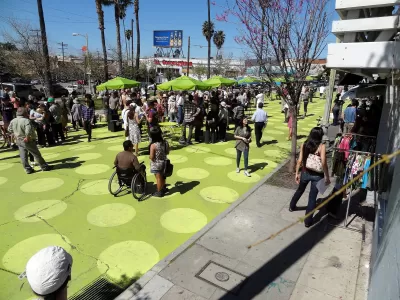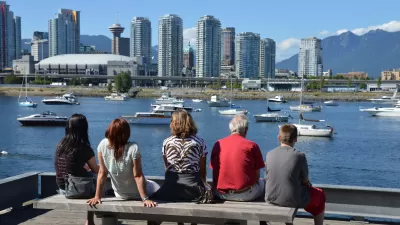'Placemaking,' the process by which cities and developers supposedly create appealing public spaces, is in a crisis, writes critic James Russell. Too many "made" places are generic and lack true relevance to the cities that build them.

The nonprofit Project for Public Spaces has, for years, championed the creation of plazas, parks, public markets, and other outdoor spaces that invite activity and make cities more appealing. They have been involved with as many as 3,000 projects to date. While "placemaking" may pursue lauadable goals, archtiecture critic James Russell cautions that some placemaking efforts are as generic as the dead cityscapes that they aim to improve.
Russell is particularly concerned about sense of place—the unique attributes of a city—rather than formulaic notions about amenties. He writes on his blog, "After you hack through thickets of slogans and vagaries, Placemaking seems to comprise a community-driven process for designing public spaces (streets, sidewalks, plazas, squares, campuses, parks, and so on) that are mixed use, host a variety of activities for diverse audiences, and are well-connected to the larger city or town."
Russell blames PPS—but not entirely:
"Placemaking could only gain currency because our building and development processes create so little that is inviting and memorable. America’s default is to assemble standardized real-estate products along roads engineered for auto throughput, and call it a day. Placelessness is so ubiquitous and such second nature that it is actually hard to think about what it takes to make a building or streetscape that’s appealing, that feels as if it belongs."
Russell offers a few examples of what he considers successful, unique places—including Seattle's Glassworks, La Jolla's Salk Center, and New York's Broadway Apple Store—and a few that represent what he considers tired New Urbanist retreads.
FULL STORY: Enough of Bogus “Placemaking”

Alabama: Trump Terminates Settlements for Black Communities Harmed By Raw Sewage
Trump deemed the landmark civil rights agreement “illegal DEI and environmental justice policy.”

Study: Maui’s Plan to Convert Vacation Rentals to Long-Term Housing Could Cause Nearly $1 Billion Economic Loss
The plan would reduce visitor accommodation by 25% resulting in 1,900 jobs lost.

Planetizen Federal Action Tracker
A weekly monitor of how Trump’s orders and actions are impacting planners and planning in America.

Wind Energy on the Rise Despite Federal Policy Reversal
The Trump administration is revoking federal support for renewable energy, but demand for new projects continues unabated.

Passengers Flock to Caltrain After Electrification
The new electric trains are running faster and more reliably, leading to strong ridership growth on the Bay Area rail system.

Texas Churches Rally Behind ‘Yes in God’s Back Yard’ Legislation
Religious leaders want the state to reduce zoning regulations to streamline leasing church-owned land to housing developers.
Urban Design for Planners 1: Software Tools
This six-course series explores essential urban design concepts using open source software and equips planners with the tools they need to participate fully in the urban design process.
Planning for Universal Design
Learn the tools for implementing Universal Design in planning regulations.
Caltrans
Smith Gee Studio
Institute for Housing and Urban Development Studies (IHS)
City of Grandview
Harvard GSD Executive Education
Toledo-Lucas County Plan Commissions
Salt Lake City
NYU Wagner Graduate School of Public Service




























